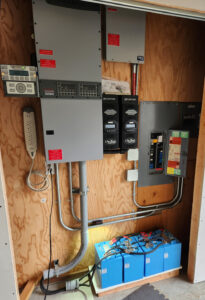DIY Grid Hybrid Solar: How Much Does it Cost?
DIY Grid Hybrid Solar: How Much Does It Cost?
Grid Hybrid Solar is a great option for homes that experience frequent or long utility outages. You get all the advantages of grid-tied solar (reducing your electric bill for starters), along with energy storage and sometimes supplemental power production (like a generator) for use when there is a grid outage. While nearly everyone would like emergency power during a utility outage, there are some important things to understand before choosing your backup power system.
What Size of Grid Hybrid Solar System Do I Need?
As with any renewable power system, there is no ‘one-size-fits-all’ option for backup power. Your backup power system should be sized for the things you want to use during an outage, and for how long you want to run them without them being recharged by your solar panels or generator, or your utility power being restored.
Can I Run My Entire House with my Backup Power?
 While it is technically possible to provide backup power for an entire home, for most people it is not economically feasible. Instead, think about what items you would definitely need to power no matter how long or short a power outage might be. These are called essential loads. It could be items like a refrigerator and/or freezer to keep food, several lights, your internet router, and an outlet where you can charge your cell phone. It’s up to you!
While it is technically possible to provide backup power for an entire home, for most people it is not economically feasible. Instead, think about what items you would definitely need to power no matter how long or short a power outage might be. These are called essential loads. It could be items like a refrigerator and/or freezer to keep food, several lights, your internet router, and an outlet where you can charge your cell phone. It’s up to you!
Keep in mind that the cost of a backup system increases with more loads and the longer you want them to run. This is typically because more energy storage is required to run your home during an outage. If you are interested in ways to reduce the cost of your grid hybrid power system, read our guide: 4 Ways to Save Money on a Grid Hybrid Solar Power System.
How Much Should I Budget for a DIY Grid Hybrid Solar?
Since not everyone powers the same loads, below is some ballpark pricing for different roof mounted DIY grid tie solar system kits with battery backup and examples of what loads they might power. Be aware that this pricing does not include standard electrical materials, permits or labor, which must also be considered when planning your budget. Pricing includes rapid shutdown but excludes estimated shipping.
| System Size | Suggested Battery | What Will it Power? | For How Long? | Approx. Price | Approx. add for Pole Mount |
|---|---|---|---|---|---|
| 3.55kW, 9 Solar Panels | (1) RELiON RB48V100 LiFePO4 Lithium Battery, 100 amp hour | TV, DVD Player, Internet Router, Cell Phone Chargers, LED Lights | About 10 hours | $15,400 | $600 |
| 7.11kW, 18 Solar Panels | (1) RELiON RB48V200 LiFePO4 Lithium Battery, 200 amp hour | Refrigerator, LED Lights, Coffee Pot, TV, DVD Player, CPAP Machine, Cell Phone Charger, Internet Router | About 24 hours | $24,900 | $3,300 |
| 9.48kW, 24 Solar Panels | (1) RELiON RB48V300 LiFePO4 Lithium Battery, 300 amp hour | Refrigerator, Microwave, LED Lights, Coffee Pot, TV, Computer, CPAP Machine, Cell Phone Chargers, Washing Machine, Internet Router | About 24 hours | $30,260 | $3,500 |
| 14.22kW, 36 Solar Panels | (1) RELiON RB48V300 LiFePO4 Lithium Battery, 300 amp hour each | Refrigerator, Freezer, Microwave, LED Lights, Coffee Pot, TV, DVD Player, Security Cameras, Computer, CPAP Machine(s), Internet Router, Septic Pump, Well Pump, Aquatic Fish Tank | About 48 hours | $43,750 | $2,300 |
Grid Hybrid power is useful, but it is not the best backup power solution in every case. If your home has infrequent power outages and you still want backup power, it may be more cost effective for you to use a generator (with or without batteries) to power your essential loads until the grid is back up. We can help you determine which backup power solution is best for you.
